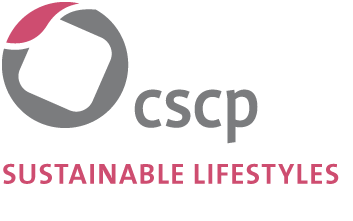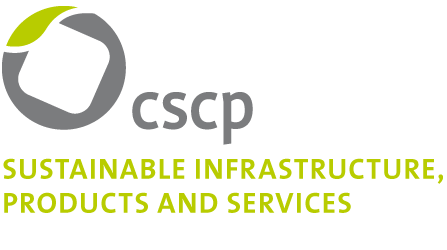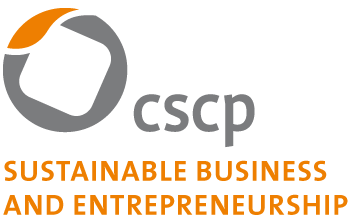
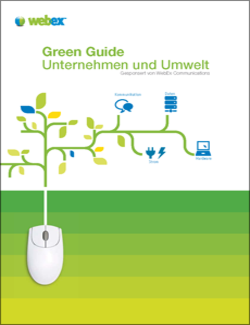
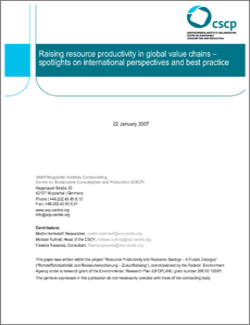
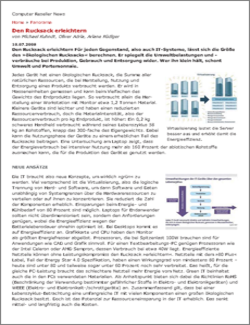
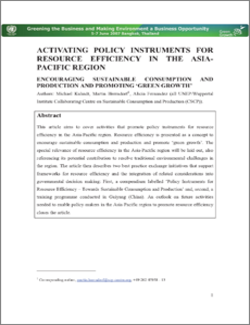
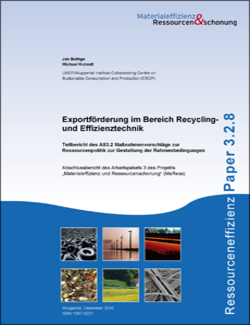
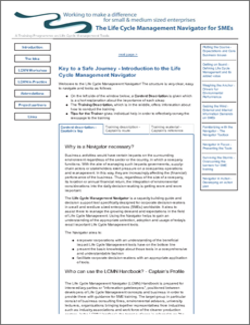
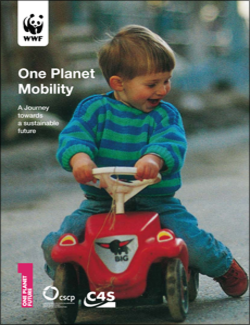
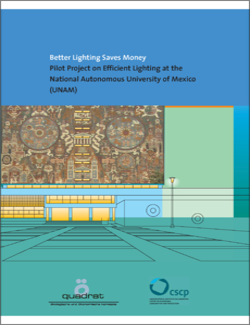
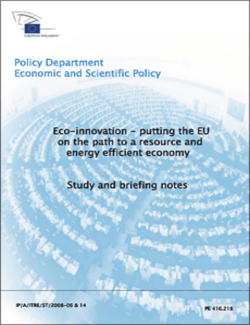
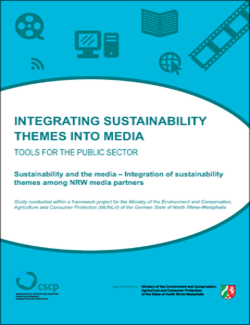
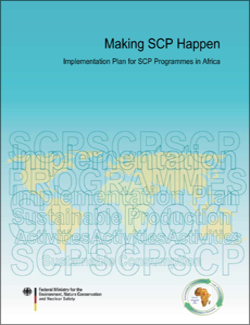
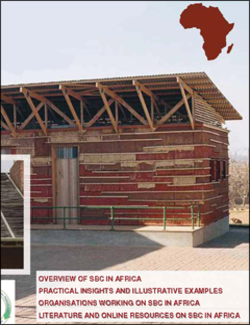
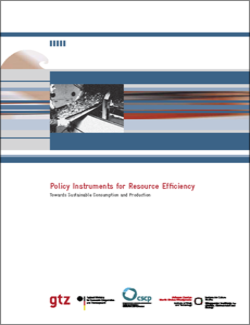
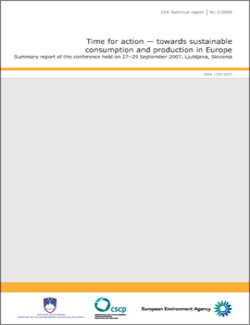
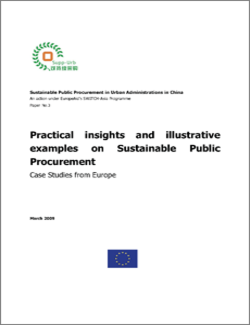
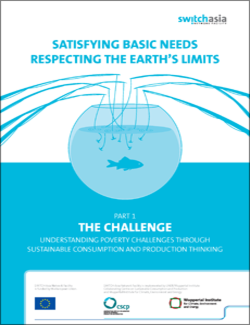
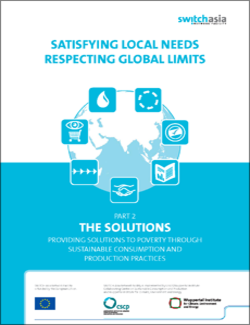
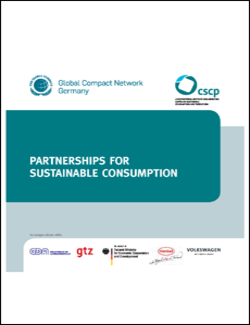
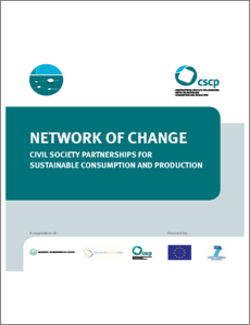
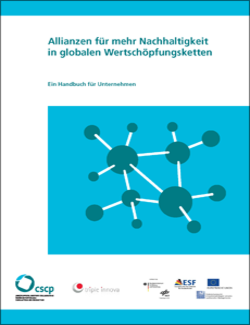
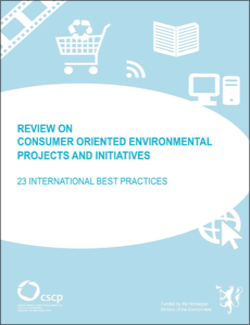
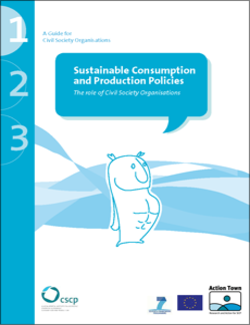
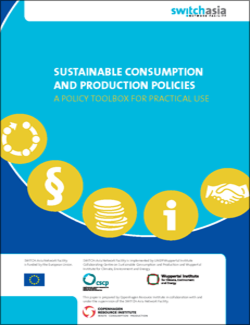
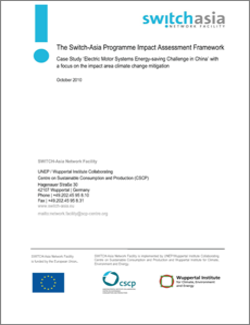
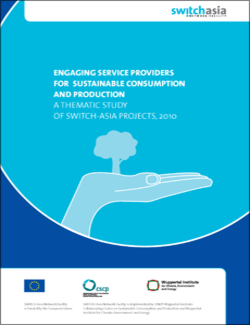
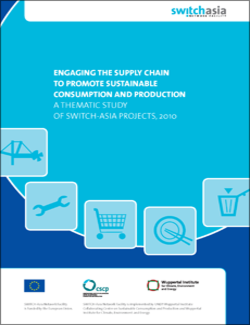
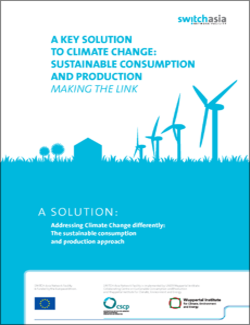
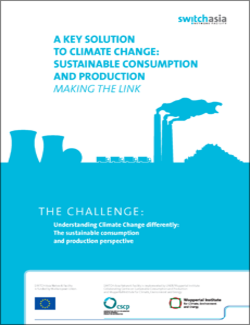
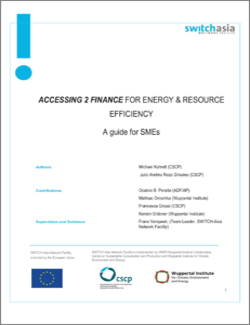
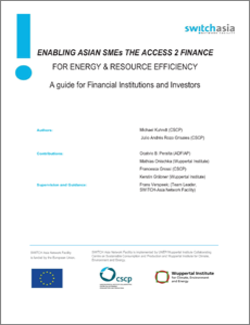
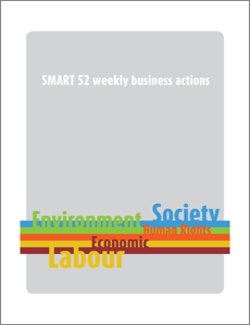
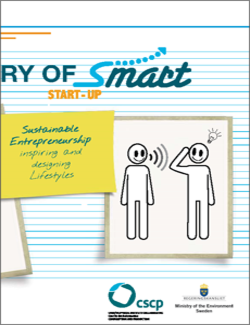
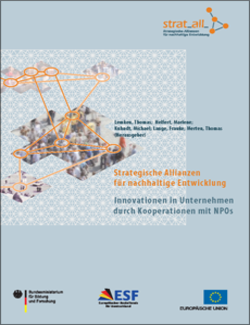
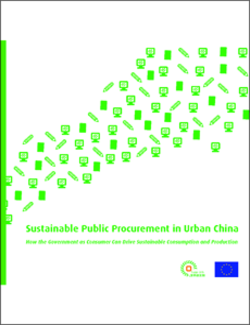
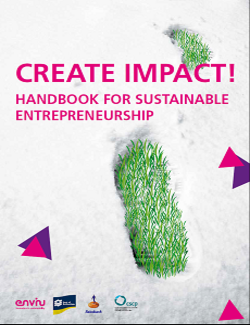
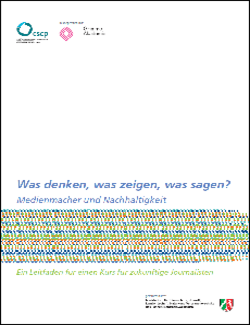
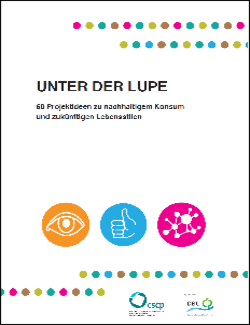
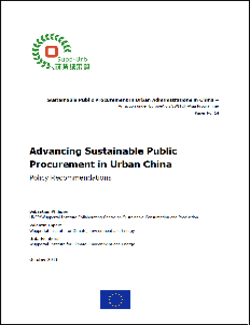
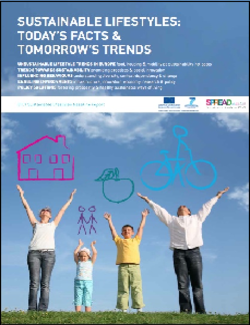
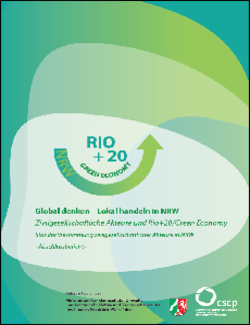
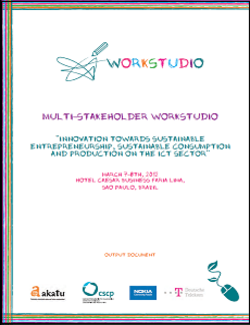
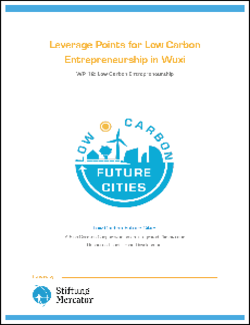
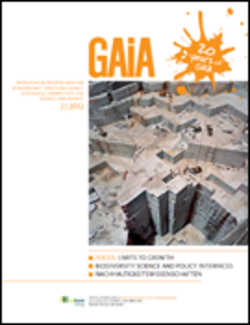
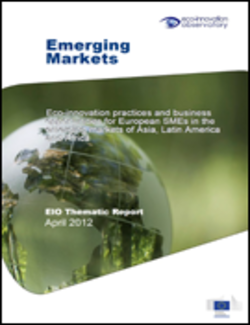
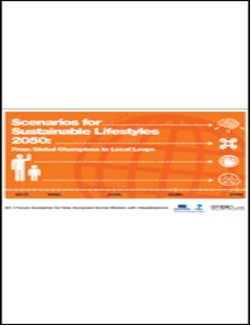
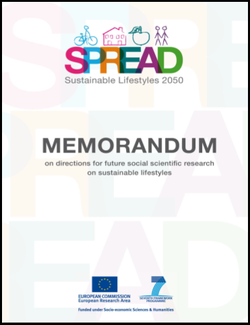
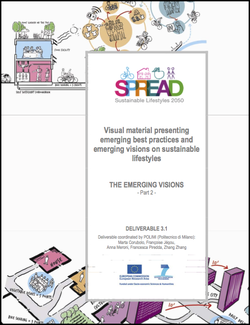
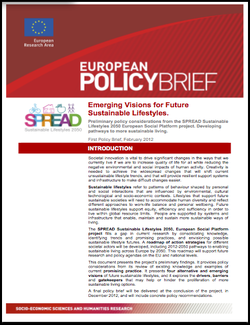
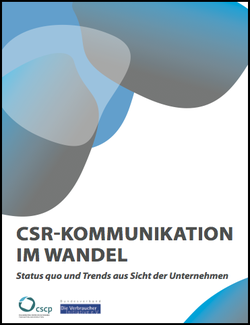
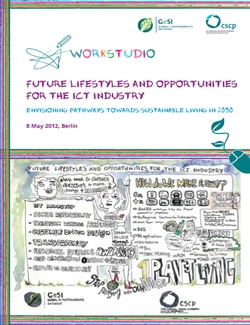
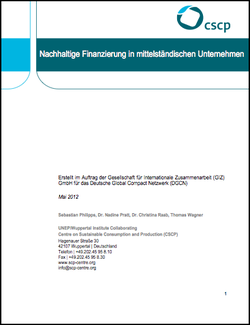
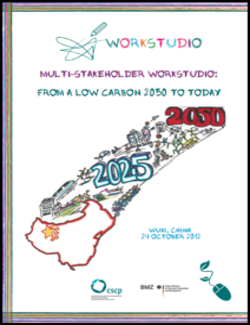
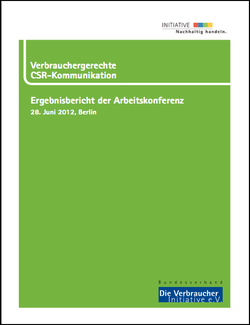
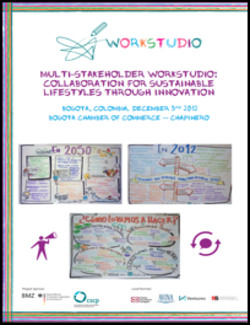
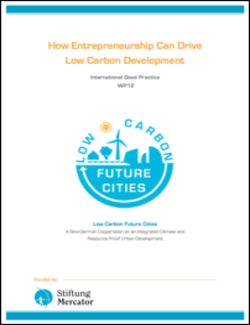
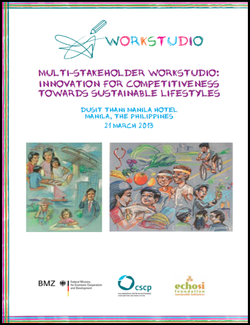
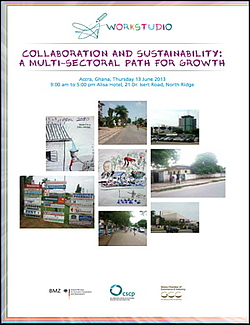
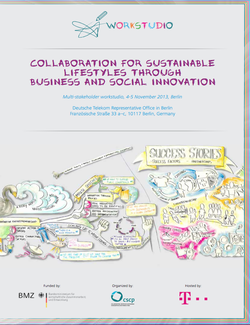
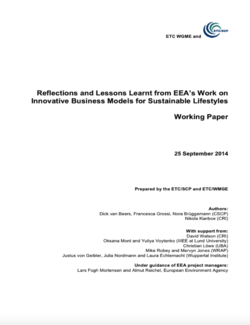
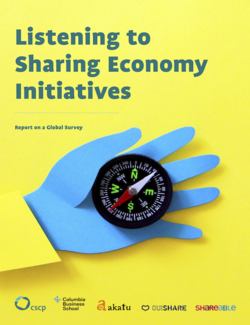
Green Guide
CSCP (2008)
Abstract:
The "Green Guide - Unternehmen und Umwelt" deals with "Green IT" and highlights through several articles concepts, tips and solutions towards smarter use of energy and resouces in the IT sector.
Raising resource productivity in global value chains
Kuhndt/Herrndorf/Tessema (2008)
Abstract:
This paper builds on results from material flow analysis that show how material flows are increasingly crossing national boundaries. As a central structure the paper takes a ‘value chain’ approach, showing perspectives on the topic from an international perspective, especially focusing on emerging best practices of public and private actors.
Den Rucksack erleichtern (Lightening the rucksack)
Kuhndt/Adria (2008)
Abstract:
This German newspaper article on Green IT discusses ways of how to minimalize the use of ressources and energy of IT-equipment. It suggests to adopt new appoaches in order to achiev a green IT sector.
Activating policy instruments for RE in the Asia-Pacific region
Kuhndt/Herrndorf/Fernandez (2008)
Abstract:
This article aims to cover activities that promote policy instruments for resource efficiency in the Asia-Pacific region. Resource efficiency is presented as a concept to encourage sustainable consumption and production and promote ‘green growth’. The article then describes two best practice exchange initiatives that support frameworks for resource efficiency and the integration of related considerations into governmental decision making.
Supporting the export of environmental technology
Bethge/Kuhndt (2010)
Abstract:
This publication analyses existing instruments aiming for supporting the export of German envirionmental technologies. Based on several expert interviews it highlights ways of how to improve and supplement existing instruments in order to better support the export of cleaner technologies and thereby more sustainable use of resources and materials worldwide.
The Life Cycle Management Navigator for SMEs
CSCP et al. (2008)
Abstract:
The online-based Life Cycle Management Navigator is a capacity building guide and decision support tool specifically designed for corporate decision-makers in small and medium sized enterprises (SMEs) worldwide. It aims to assist them to manage the growing demand and expectations in the field of Life Cycle Management. Using the Navigator helps to gain an understanding of the appropriate selection, adoption and usage of today's most important Life Cycle Management tools.
One Planet Mobility Report
WWF/CSCP/C4S (2008)
Abstract:
This report takes a systemic approach to understanding the impacts, trends and drivers of personal mobility. Drawing on this understanding, it presents an innovative step-by-step framework for system-wide change towards sustainable personal mobility. It concludes by describing the alternative practical project ideas that resulted from One Planet Mobility on tackling unsustainable mobility patterns. The report is intended for a wide range of decision-makers from business, government and civil society who work with transport-related issues.
Better Lighting Saves Money
CSCP/Ö-Quardrat (2009)
Abstract:
This report includes a brief account of the work at the National Autonomous University of Mexico (UNAM) in order to improve the lighting efficiency in its University City campus (Ciudad Universitaria), located in the south of Mexico City. It presents the status of lighting practices at the UNAM an of Mexico in general. In order to meet the electricity demand of perspective laboratories and new facilities, saving is proven to be the very best option.
Study on Eco-Innovation
WI, Factor 10, SERI, CSCP (2009)
Abstract:
The objective of this study is to support the European Parliament’s ITRE Committee in its work on the EU's industrial and energy policy and to give advice on the following issues: Why is the issue of resource scarcity back on the agenda? What are the strategic conclusions for the EU? What can the EU expect from eco-innovation in a large range of industrial sectors? Are existing measures meeting the EU aims and expectations, and what new policy initiatives should be set forward?
Integrating Sustainability Themes into Media
CSCP (2010)
Abstract:
The project “Sustainability and the media – Integration of sustainability themes among NRW media partners” aims to demonstrate how sustainability topics can be integrated in existing as well as in new, emerging and not yet existing media formats. This study aims to create framework conditions for concrete actions and project ideas, such that public entities can promote enhanced ‘sustainability performance’ of different media formats.
Making SCP Happen
CSCP (2010)
Abstract:
This document is prepared on the basis of the experience and lessons learnt from the implementation of the project on “The Development and Implementation of National and/or Citywide 10-Year Framework of Programmes on SCP in Africa”. This document introduces the SCP programmes of the pilot countries and cities and presents a generic framework for the procedure that can be followed in their implementation. It also provides more detailed implementation plans where the generic framework has been adapted to fit the pilot countries’ and cities’ SCP programmes.
Sustainable Building and Construction in Africa
Tessema/Taipale/Bethge (2008)
Abstract:
This booklet intends to clarify the concept of Sustainable Buildings and Construction (SBC) in an African context. It is based primarly on Africa based research and building projects implemented in different parts of the region. The publication is meant for real estate developers, building industry professionals, researchers, planners, policy makers and building users.
Policy instruments for Ressource Efficiency
GTZ/CSCP (2006)
Abstract:
This publication aims to provide a quick, hands-on overview of selected SCP policy instruments for boosting resource efficiency. It builds on recent discussions and practical experience with these instruments, both from developed and developing countries. This compendium directly targets politicians, NGOs and SCP practitioners in intermediary organisations.
Time for action - Towards SCP in Europe
EEA, CSCP, Rep. Of Slovenia (2008)
Abstract:
The conference 'Time for action — Towards sustainable consumption and production in Europe' was held on 27–29 September 2007 in Ljubljana, Slovenia. The objective of this summary report is to present the outcomes of the conference by focusing on the potential solutions and actions proposed and the recommendations developed in the Focus Labs on the areas of housing, food and drink and mobility, and the Exchange Labs as well as the panel discussion of the final conference plenary session.
Sustainable Public Procurement in China
Tessema/Marsille (2009)
Abstract:
Sustainable public procurement (SPP) can be understood and replicated easily when supported by practical insights and examples. This document illustrates SPP with 20 case studies collected from Western Europe in order to create inspiration for promoting the practice of SPP in China public institutions. The presented case studies mainly focusing on office consumables, electronics, and furnitere.
Satisfying basic needs - Respecting the Earth's limits - The Challenge
CSCP/WI (2009)
Abstract:
The booklet has two sides, one presenting challenges and the other presenting solutions. The "challenge-side" of the booklet deals with the challenges of poverty reduction, and assists proposal developers in defining problems and searching for solutions in SCP.
Satisfying basic needs - Respecting the Earth's limits - The solutions
CSCP/WI (2009)
Abstract:
The booklet has two sides, one presenting challenges and the other presenting solutions. The "solution-side" of the booklet presents some sustainable consumption and production (SCP) solutions to poverty and helps identify relevant practices for those developing projects within the framework of the SWITCH-Asia programme.
Partnerships for Sustainable Consumption
Schaller/Kuhndt/Pratt (2009)
Abstract:
This booklet is the result of a workshop series carried out with members and actors of the German Global Compact Network (DGCN) in 2007 and 2008. It explores the importance of partnerships between organisations and institutions as an essential enabler and driver of
sustainable consumption initiatives and business strategies. This booklet highlights not just existing partnerships through current and genuine examples, but serves as inspiration for further collaborations for sustainable consumption.
Network of change
Lähteenoja/Kuhndt/Charter/Csobod (2010)
Abstract:
This booklet presents examples of successful promotion of sustainable consumption and production (SCP) through civil society organisation (CSO) partnerships. In addition to CSOs themselves, the target audience for this booklet includes researchers, policy makers and businesses interested in working with CSOs. The booklet introduces a Network of Change with a focus on civil society organisations and presents five different CSO partnership models to promote SCP.
Alliances for Sustainability in Value Chains
Biermann/Schaller (2010)
Abstract:
This booklet aims to facilitate the building of alliances between enterprises and organisations in order to strengthen their commitment to sustainability. This is achieved by collaboration with other enterprises and civil society organisations or use of already existing alliances.
International Review on Consumer Oriented Environmental Projects and Initiatives
Petruschke/Kotakorpi/Coles (2010)
Abstract:
This paper is a review of projects and initiatives aimed at encouraging sustainable consumption patterns and changing our lifestyles. It presents more than 20 case studies from around the world and shows how positive impact has been created.
SustainablefConsumption and Production Policies - CSO Guide
CSCP (2010)
Abstract:
This booklet has been written for people working and volunteering on sustainability issues in civil society organisations (CSOs). It focuses on policy instruments that can be used to influence and foster positive change towards sustainable consumption and production.
Sustainable Consumption and Production Policies - The SCP Policy Toolbox
CSCP/Wuppertal Institute/Copenhagen Resource Institute (2011)
Abstract:
The aim of the Policy Tool Box is to to enhance their knowledge on SCP policies and enable them to provide concrete input to SCP policy-making to ensure optimal and long lasting impacts of the SWITCH-Asia programme.
The SWITCH-Asia Programme - Impact assessment framework
Tuncer/Schröder (2010)
Abstract:
This example case study focuses on the ‘Electric Motor Systems Energy-saving Challenge in China’ project. It is the first SWITCH-Asia impact case study and adopts the impact indicator framework under the impact area i.e. climate change mitigation.
Engaging Service Providers for SCP
CSCP/Wuppertal Institute (2010)
Abstract:
Service Providers are the backbone for the promotion, communication, and technical assistance how to apply SCP. This publication highlights results from studies on a group of ongoing SWITCH -Asia projects aiming to understand the role and involvement of service providers and their potential to scale-out SCP.
Engaging the supply chain to promote SCP
CSCP/Wuppertal Institute (2010)
Abstract:
The thematic study on on-going SWITCH-Asia projects examines the role that engaging the supply chain is playing and potentially can play in enhancing sustainable consumption and production. The study also highlights opportunities for replication of Sustainable Consumption and Production (SCP) practices, and recommends potential opportunities for enhanced supply chain engagement to future projects.
A Key Solution to Climate Change: SCP - Making the Link
CSCP/Wuppertal Institute (2009)
Abstract:
This booklet has been published by the EU funding programme SWITCH-Asia: Promoting Sustainable consumption and Production. It is aimed at European and Asian businesses, organisations involved in developing sustainability solutions, policy-makers, and project developers wanting to help reduce the climate change impact of business in as broad a way as possible. This booklet is two-folded, while the first part deals with the ‘challenges’ in understanding the causal relationship between economic activities and climate change as the second part highlights some practical ‘solutions’ that can be funded, at least in part, by the programme.
A Key Solution to Climate Change: SCP - The challenge
CSCP/Wuppertal Institute (2009)
Abstract:
This booklet has been published by the EU funding programme SWITCH-Asia: Promoting Sustainable consumption and Production. It is aimed at European and Asian businesses, organisations involved in developing sustainability solutions, policy-makers, and project developers wanting to help reduce the climate change impact of business in as broad a way as possible. This booklet is two-folded, while the first part deals with the ‘challenges’ in understanding the causal relationship between economic activities and climate change as the second part highlights some practical ‘solutions’ that can be funded, at least in part, by the programme.
Accessing 2 Finance for Energy & Resource Efficiency - A guide for SMEs
Kuhndt/Rozo Grisales (2010)
Abstract:
This first report on access to finance helps Asian SMEs to identifythe feasible financial instruments. It seeks to provide hints and advices to SMEs on how to integrate SCP and E&RE issues, into the development process of a strategic planning when appliying to financial instruments.
Enabling Asian SMEs the Access 2 Finance For Energy & Resource Efficiency - A guide for Financial Institutions and Investors
Kuhndt/Rozo Grisales (2010)
Abstract:
This second report on access to finance helps Asian and international financial institutions from the private and public sectors realize the importance of redirecting institutional and operational strategies towards access to finance for SCP.
SMART 52 weekly business action
Tyson/Lugt/Hawkins et al. (2011)
Abstract:
The aim of this booklet is to introduce the basics of environmental practice and social responsibility for managers and employees of SMEs, and includes related examples, commentaries, and tips for action. It suggests easy accessible tools to improve daily business and increases the competitiveness of your business.
SMART Start-up: The story
CSCP (2011)
Abstract:
With the creative use of images and an engaging writing style, each section of this document contains a brief introduction and a comprehensive description of the evolution of each phase of the SMART Start-up project. Amoung others, it illustrates the core concepts and rationale behind the project and introduces tools and methodologies used during the development of the project's training workshops.
Strategic Alliance for Sustainable Development
Kuhndt/Philipps et al. (2010)
Abstract:
The success and the ability to innovate of a network strongly depends on the structure of collaboration of all partners involved. This paper analyses different elements of network structures and shows how they can be designed to become more efficient.
Sustainable Public Procurement in Urban China
Philipps, S., Marsille, C., & Schröder, P. et al. (2011)
Abstract:
Implementing sustainable public procurement (SPP) in urban China carries immense potentials for sustainable consumption and production in the world's second-largest economy and beyond. This booklet provides hands-on experience from three Chinese cities. It offers concrete recommendations for how to strengthen SPP as a way of making market-based consumption and production more sustainable through government action on a local level.
Create Impact! Handbook for Sustainable Entrepreneurship
Pascual, van Klink, Grisales (2011)
Abstract:
The CSCP is ready to support you make your entrepreneurial ideas come true! CREATE IMPACT! will help you centralize your business idea and define your business model. Enjoy the reading!
Was denken, was zeigen, was sagen? Medienmacher und Nachhaltigkeit
Müller, Georgi, Schneider, Guillen (2011)
Abstract:
The handbook “What to think? What to show? What to say? Content creators and Sustainability” presents strategies how to integrate sustainability topics in mainstream media. It offers practical training modules and awareness session that target journalists and other media practitioners. The training module can be used by journalist academies or media training institutes who aim to increase knowledge and awareness on sustainability
Unter der Lupe - 60 Projektideen zu nachhaltigem Konsum und zukünftigen Lebensstilen
Groezinger, Kuhndt (2011)
Abstract:
The compilation “60 Project ideas for sustainable consumption and future lifestyles” presents an exciting collection of different ideas on how to behaviour can be changed by using the strategies visualisation, capacity building and networking from all over Germany. The examples address the topics every day shopping, housing and mobility.
Advancing Sustainable Public Procurement in Urban China
Philipps/Espert/Eichhorst (2011)
Abstract:
How could China further improve the effectivity of its Sustainble Public
Procurement system? The presented policy recommendations summarise the
learnings from a three-year project under the EU SWITCH-Asia Programme.
Sustainable Lifestyles: Today’s Facts & Tomorrow’s Trends
Backhaus/Breukers/Mont/Paukovic/Mourik (2011)
Abstract:
According to the report Sustainable Lifestyles: Today’s Facts & Tomorrow’s Trends, many initiatives, policies, businesses and social movements have accumulated in Europe in the last decade which have motivated citizens to change their lives to higher quality, less impact on the environment, and less costs. The report prepared by the CSCP coordinated EU project SPREAD Sustainable Lifestyles 2050 presents a synthesis of research, leading policy and practice, and stakeholder views on potential pathways toward a further spreading of sustainable lifestyles.
Rio+20 Green Economy NRW - Global denken – Lokal handeln in NRW
Brüggemann, Groezinger (2012)
Abstract:
Im Mittelpunkt des Projekts „Global denken – Lokal handeln in NRW. Zivilgesellschaftliche Akteure und Rio+20/Green Economy“ stehen Aktivitäten, Wünsche und Ideen von zivilgesellschaftlichen Akteuren in Nordrhein-Westfalen (NRW) zu Rio+20 und insbesondere zum Thema Green Economy. Durch deren Sammlung und Zusammenstellung im Rahmen einer Standortbestimmung sollen Potenziale für gemeinsame Aktivitäten mit Blick auf Rio+20 und für mögliche Partnerschaften in NRW auch über Rio+20 hinaus identifiziert werden. Auf einem Workshop im Ministerium für Klimaschutz, Umwelt, Landwirtschaft, Natur- und Verbraucherschutz des Landes Nordrhein-Westfalen (MKULNV) in Düsseldorf wurden die Ergebnisse der Standortbestimmung diskutiert und weiter spezifiziert. Das Ziel ist eine bessere Vernetzung von zivilgesellschaftlichen Akteuren in NRW.
Workstudio - Innovation towards sustainable entrepreneurship, sustainable consumption and production in the ICT-sector"
CSCP, Instituto Akatu (2012)
Abstract
The outputs of the mutli-stakeholder workstudio 'innovation towards sustainable entrepreneurship, sustainable consumption and production on the ICT sector' are now available.
For more information click here
Leverage Points for Low Carbon Entrepreneurship in Wuxi
Philipps, Sebastian; Francesca Grossi; Neil Coles (2012)
Abstract
Entrepreneurial activities can either fuel or slow down climate change. The effect to a great extend depends on the underlying business model. However, all business models have to prove viable in their politico-economic context: the entrepreneurial landscape.
This paper describes how such an entrepreneurial landscape can be shaped, in order to stipulate low carbon business activities. It does so for the concrete case of Wuxi, China. The objective has been to come up with recommenda- tions for a tailored best practice selection—examples that could be adapted to and replicated in Wuxi to let entrepreneurs become enablers of a future low carbon economy.
For more information click here
Research landscape sustainable consumption
Kuhndt/Groezinger (2012)
Abstract
Sustainable consumption styles is a trend. Besides consumers also politicians hope that this will lead to more sustainability. But what are the reasons for more social ecological and social responsible consumption and how can this development be influenced in a positive way? Scientists have tried to answer these questions.
Emerging Markets - Eco-innovatian practices and business opportunities for European SMEs in the emerging markets of Asia, Latin America and Africa
Grossi/Van Beers/Doranova/Markianidou/Miedzinski (2012)
Abstract
The report explores the role of European SMEs in promoting a green economy. It analyses the challenges and opportunities for European eco-innovators that exist within the emerging markets in Asia, Africa and Latin America. The growing markets in these developing economies, along with the increasing recognition of the sustainability and environmental agendas have created, and also increased, demand for eco-innovations and eco-industrial technology and services. Through international collaboration, European eco-innovators can increase their competitive market advantages while simultaneously assist those countries in economic and technological leapfrogging and give added environmental value to the development process.
Scenarios for Sustainable Lifestyles 2050 -
From Global Champions to Local Loops
The SPREAD Consortium (2012)
Abstract
This nicely designed report highlights four different options of more sustainable future ways of living in 2050. They provide a starting point for identifying opportunity spaces for the development of creative strategies to not only mainstream current sustainable practices but also to develop new solutions for more sustainable living societies. Download a printable version of the document
SPREAD Memorandum
on directions for future social scientific research on sustainable lifestyles
The SPREAD Consortium (2011)
Abstract
This Memorandum presents first findings of the SPREAD Sustainable Lifestyles 2050 project. It is intended to provide the European Commission with input in the form of potential research topics regarding the preparation of future research programmes, particularly concerning the needs for future social scientific research on sustainable lifestyles.
The Emerging Visions on Sustainable Lifestyles
The SPREAD Consortium (2011)
Abstract
This visual material presents emerging best practices and emerging visions on sustainable lifestyles not yet present in Europe but that help to imagine what today’s promising practices could look like if projected into the future.
European Policy Brief -
Emerging Visions on Future Sustainable Lifestyles
The SPREAD Consortium (2012)
Abstract
This document presents the SPREAD’s preliminary findings. It provides policy considerations from the review of existing knowledge and examples of current promising practice. It presents four alternative and emerging visions of future sustainable lifestyles, and explores the drivers, barriers and gatekeepers that may help or hinder the proliferation of more sustainable living options. A final policy brief will be delivered at the conclusion of the SPREAD project, in December 2012, and will include concrete policy recommendations.
CSR Communication in Transformation -
Status quo and future trends from a business angle
Pratt/Wagner/Beckers (2012)
Abstract
In this report the CSCP summarizes the results of a study it has conducted in collaboration with the VERBRAUCHER INITIATIVE e.V. focusing on consumer-oriented CSR-Communication. Interviewing 40 multinational companies and 4 non-governmental organisations, this report shows the status quo and future trends in CSR-Communication. Based on the finding that the consumer is the most important target group of CSR-Communication, the report outlines the trends on how communication will be conducted more by dialogue and interaction between company and its consumers. Moreover it describes the different communication instruments, which are used in order to pursue a target-oriented CSR-Communication strategy (e.g. digital and social media or point-of-sale staff). It outlines the challenges companies encounter when addressing the consumer and details strategies and measures (e.g. partnerships, measuring consumers feedback) companies can use to overcome these problems. The report provides the foundation towards a target-oriented CSR-Communication, which will benefit both companies and consumers.
Future Lifestyles and Opportunities for the ICT Industry -
Envisioning Pathways towards Sustainable Living in 2050
Guillen (2012)
Abstract
In may 2012 an interactive Workstudio took place in Berlin. It involved stakeholders in the co-creation of a vision of lifestyles in 2050 and the different actions that the Information and Communication Technology sector can take towards making these lifestyles and consumption patterns more sustainable. Through its innovative format of interactive discussions, presentations and workshops, the workstudio allowed participants to:
- Increase their knowledge of ICT solutions and business models that impact lifestyles in areas such as health, mobility and housing;
- Build a common understanding of current trends and opportunities for enhancing the capacity of the ICT sector and its impact on lifestyles;
- Explore potential collaboration areas, examine future directions and co-create a vision of how stakeholders can support sustainable living through ICT in the future;
- Network with experts from the sustainability field, ICT sector and beyond, creating synergies for future business development and encouraging lifestyle pattern shifts.
This report shows all the outcomes of the Workstudio.
Nachhaltige Finanzierung in mittelständischen Unternehmen
Philipps/Pratt/Raab/Wagner (2012)
Abstract
German SMEs still find it difficult to finance their sustainability investments. Until today, both banks and SMEs lack common standards to assess the performance of investments with regard to their environmental, social and governance (ESG) impact. These are the key findings from a study the CSCP carried out for the German Global Compact Network in 2012. The results stress the importance of defining the business case for sustainability with more standardised methods, and creating new solutions for improved financial intermediation towards SMEs in Germany.
China Workstudio: From a Low Carbon 2050 to today.
Guillen/Spittler (2012)
Abstract
This document contains the outcomes of the first BIG2050 workstudio that took place in China on October 24, 2012. Participants analyzed more sustainable ways of living through the identification and discussion of social innovation and entrepreneurship, in the context of consumers’ behavior in China. |
The workstudio From a Low Carbon 2050 to Today focused on sustainable consumption and demand side management. It offered insights into innovative international tools and approaches used for community inclusion as well as networking opportunities with partners, donors and support organizations working on consumer-related issues.
Verbrauchergerechte CSR Kommunikation
Ergebnisbericht der Abeitskonferenz
Pratt/Beckers/Wagner (2012)
Abstract
Corporate Social Responsibility (CSR), die Verantwortung von Unternehmen für ihre sozialen und ökologischen Auswirkungen auf die Gesellschaft, gewinnt bei Unternehmen wie auch bei Verbrauchern und Politik zunehmend an Bedeutung. Um Verunsicherungen der Verbraucher vorzubeugen und CSR als ein zentrales Kriterium bei Kaufentscheidungen zu etablieren, ist eine zielgerichtete, glaubwürdige und transparente CSR-Kommunikation der Unternehmen notwendig, welche den Verbraucher tatsächlich erreicht und wirksam informiert. Daher richtete der Bundesverband der VERBRAUCHER INITIATIVE e. V. zusammen mit dem CSCP eine Arbeitskonferenz zum Thema „Verbrauchergerechte CSR-Kommunikation“ aus.
Sie brachte am 28. Juni 2012 in Berlin 50 Experten aus Unternehmen (vor allem Handel), Politik und NGO in Berlin zusammen, um gemeinsam Leitlinien für eine verbrauchergerechte CSR-Kommunikation zu entwickeln. Ein solcher Orientierungsrahmen ist notwendig, um CSR-Aktivitäten im komplexen Feld der Nachhaltigkeit kommunikativ sichtbarer zu machen, Transparenz und Glaubwürdigkeit zu erhöhen und Verbrauchern eine Unterstützung für nachhaltigere Kauf- und Nutzungsentscheidungen zu geben. Die Ergebnisse zweier zuvor durchgeführter Studien zu einer verbrauchergerechteren CSR-Kommunikation sowie Good Practice Beispiele wurden den Teilnehmern in der Tagung präsentiert und dienten ihnen als Grundlage für die Diskussion eines Orientierungsrahmens für eine verbrauchergerechte CSR-Kommunikation.
Colombia Workstudio - Collaboration for sustainable lifestyles through innovation
Guillen/Van Beers/Rozo/Spittler (2013)
Abstract
After a very successful event with Colombian stakeholders, the information collected by the projects BIG2050 and BISS is presented in this report. All the outcomes will be incorporated to the discussions of the Global Network on Sustainable Lifestyles
and the Global Network on Sustainable Innovation for Entrepreneurship.
How Entrepreneurship Can Drive Low Carbon Development
International Good Practice
Grossi/Philipps/Coles (2013)
Abstract
Economic growth in China has followed a resource-intensive path similar to many of the world’s developed countries. Low-carbon, energy, and resource efficient business strategies are expected to play an important part in levering a paradigm shift. What are the necessary conditions to enable entrepreneurial action to achieve this aim? This report provides key actors from politics, business, civil society and research with concrete triggers for improving the framework conditions for low carbon business. By utilising these, the actor groups can actively harness market forces for climate protection in China and create co-benefits for society, economy and environment.
|
Philippines Workstudio: Innovation for Competitiveness towards Sustainable Lifestyles
Guillen/Van Beers/Nicolau/Montemayor/Laurel (2013)
Abstract
If projections for 2050 are true, the Philippines will by then be the 16th largest economy in the world… what are Filipinos doing to make this promising future a sustainable one? During the workstudio Innovation for competitiveness towards sustainable lifestyles the stakeholders discussed about the opportunities and challenges to live sustainably in their country today and what can they offer to other countries as part of their learning process. The proceedings of this meeting are available at the Global Network on Sustainable Lifestyles (www.vision2050.net) and the Global Network on Sustainable Innovation for Entrepreneurship (www.scaling-up.net). Follow up discussions and match-making opportunities also feature in both networks.
Collaboration and Sustainability: A Multi-Sectoral Path for Growth (Ghana Workstudio)
Guillen /Nicolau/ van Beers/ Spittler/ Konadu/ Awuye (2013)
Abstract
The Ghanaian “good life” in 2050 is a balance between employment conditions, proper use of natural resources and high quality governance, with communication and mobility seen as the areas with the least relevance. Through the visioning workshop, participants crafted scenarios and assessed the current reality and challenges ahead.
These are some insights of the visioning session of a Workstudio, the CSCP conducted in Accra, Ghana, in June 2013. It hosted 50 participants representing a range of stakeholder groups from academia, environmental protection agencies, and the business community, among others. Participants explored lifestyles, aspirations and practices in Ghana as well as the ways that innovation and entrepreneurship can support sustainable living solutions. Interactive working groups and collaborative methodologies enabled participants to engage in a rich dialogue discussing current trends, perceptions and aspirations. Through insightful keynote speeches, an interactive visioning session and facilitated discussion tables, participants questioned their individual preconceptions, shared their experiences and suggested innovative ways to support sustainable lifestyles from several different points of view.
Multistakeholder Workstudio: Collaboration for Sustainable Lifestyles through Business and Social Innovations (Berlin Workstudio)
Guillen /Nicolau/ Spittler/ Duarte/ Hicks /van Beers (2014)
Abstract
The last workstudio of the projects Budding Ideas Glocally for 2050 (BIG2050) and Business Innovation for Sustainable Scale-up (BISS) brought together 60 participants representing different stakeholders including policy makers, development agencies, entrepreneurs, civil society organizations, consumer groups, businesses, financial institutions, academia and media representatives from across Europe.
During the workstudio, examples of social action and business development innovation were explored to serve as a basis to identify success factors, drivers such as policies, consumer behaviour and technological developments, that enable the creation of partnerships to support scaling up the strategies and opportunities for sustainable living. This report summarizes the activities and outcomes of this one and half day event that took place in Berlin on November 4 and 5, 2013.
Reflections and Lessons Learnt from EEA’s Work on Sustainable Lifestyles
van Beers/Grossi/Ki/ørboe/Brüggemann et al. (2014)
Abstract
The overall objective of this report is to draw lessons learnt from four years of EEA’s work on innovative business models for sustainable lifestyles and provide a basis for discussion and subsequent decisionmaking to further advance the values created by business models promoting sustainable lifestyles.
The report addresses the following topics:
Identification of innovative business model typology that supports more sustainable lifestyles, to include its relevance to consumption and production systems as well as examples of good practices. The scope of this report includes business models in new businesses, small- and medium-sized enterprises (SMEs), larger companies and large multinationals. Taking it further, this report identifies value creation models in public and private organisations.
Common barriers and drivers to business models for sustainable lifestyles, and thereby identifying knowledge gaps as well as opportunity areas for further work.
Means to enable the scaling up of values created by business models for sustainable lifestyles and their role in meeting the EU 2050 vision and supporting EU’s goals and targets.
Key lessons learnt to scale up the values created by innovative business models to realize sustainable lifestyles in Europe.
The Sharing Economy is scaling up
Wagner/Kuhndt/Lagomarsino/Mattar, (2015)
Abstract
On the basis of a global empirical survey, the report generates an understanding of the Sharing Economy initiatives’ business models, the enablers and success factors as well as the barriers they face. All of the surveyed initiatives are active in either sharing of services, goods and food, mobility or space. Business models are based on P2P, B2C, B2B. Most of the initiatives are start-ups that are operating either for profit or are non-profit. Additionally, interviews with six sharing experts supported the analysis of the results and added further interesting input.
The main findings suggest that the initiatives from the Sharing Economy are creating value beyond economic aspects for their customers. They are mostly focusing on tech savvy millennials in urban areas. Establishing a critical mass and overcoming traditional consumer habits are perceived as the main challenge from the initiatives´ perspective. For scaling up their activities, financial barriers pose the main challenge to the initiatives. Trust and user information play a strategic role for them. Partnering among the Sharing initiatives or with conventional businesses or the public sector is seen as a possibility for further development. Broader target groups, reaching rural areas and holistic approaches are suggested as success factors for the initiatives.
2015
The Sharing Economy is scaling up
(Wagner/Kuhndt/Lagomarsino/Mattar, 2015)
Harvesting, Mapping & Analysing Arguments, Catalyst Project Report.
(Rosa Strube, 2015)
Harnessing the power of collective intelligence: Communities and technologies, Catalyst Project Final Report.
(Arniani M., Parent M.-A, Strube, R. et. al., 2015)
2014
Reflections and Lessons learnt from EEA's Work on Sustainable Lifestyles
(van Beers/Grossi/Ki/ørboe/Brüggemann et al. 2014)
(Guillen/Nicolau/Spittler/Duarte/Hicks/van Beers, 2014)
2013
Collaboration and Sustainability: A Multi-Sectoral Path for Growth (Ghana Workstudio)
(Guillen/Nicolau/van Beers/Spittler/Konadu/Awuye, 2013)
Philippines Workstudio: Innovation for Competitiveness towards Sustainable Lifestyles
(Guillen/Van Beers/Nicolau/Montemayor/Laurel, 2013)
How Entrepreneurship Can Drive Low Carbon Development - International Good Practice
(Grossi/Philipps/Coles, 2013)
Colombia Workstudio - Collaboration for sustainable lifestyles through innovation
english / español
(Guillen/Van Beers/Rozo/Spittler, 2013)
2012
Verbrauchergerechte CSR Kommunikation - Ergebnisbericht der Arbeitskonferenz
(Pratt/Beckers/Wagner, 2012)
China Workstudio: From a Low Carbon 2050 to today.
(Guillen/Spittler, 2012)
Nachhaltige Finanzierung in mittelständischen Unternehmen
(Philipps/Pratt/Raab/Wagner, 2012 - German)
Future Lifestyles and Opportunities for the ICT Industry
(Guillen, 2012)
CSR Communication in Transformation - Status quo and future trends from a business angle
(Pratt/Wagner/Beckers, 2012 - German)
European Policy Brief - Emerging Visions on Future Sustainable Lifestyles
(SPREAD Consortium, 2012)
Scenario for Sustainable Lifestyles 2050 - From Global Champions to Local Loops
(SPREAD Consortium, 2012)
(Grossi/Van Beers/Doranova/Markianidou/Miedzinski , 2012)
Research landscape sustainable consumption
(Kuhndt/Groezinger, 2012)
(Philipps/Grossi/Coles, 2012)
(CSCP/Instituto Akatu, 2012)
Rio+20 Green Economy NRW - Global denken – Lokal handeln in NRW
(Brüggemann/Groezinger, 2012)
2011
The Emerging Visions on Sustainable Lifestyles
(SPREAD Consortium, 2011)
(SPREAD Consortium, 2011)
Today´s Facts & Tomorrow´s Trends
(Backhaus/Breukers/Mont/Paukovic/Mourik, 2011)
Advancing Sustainable Public Procurement in Urban China
(Philipps/Espert/Eichhorst, 2011)
Unter der Lupe - 60 Projektideen zu nachhaltigem Konsum und zukünftigen Lebensstilen
(Groezinger/Kuhndt, 2011)
Was denken, was zeigen, was sagen? - Medienmacher und Nachhaltigkeit
(Müller/Georgi/Schneider/Guillen, 2011)
Create impact! - Handbook for Sustainable Entrepreneurship
(Pascual/van Klink/Rozo Grisales, 2011)
Sustainable Public Procurement in Urban China
(Philipps, S., Marsille, C., & Schröder, P. et al. 2011)
SMART 52 weekly business action
(Tyson/Lugt/Hawkins et al., 2011)
(CSCP, 2011)
Sustainable Consumption and Production Policies - The SCP Policy Toolbox
(CSCP/Wuppertal Institute/Copenhagen Resouce Institute, 2011)
2010
The SWITCH-Asia Programme - Impact assessment framework
(Schröder/Tuncer, 2010)
(Kuhndt/Rozo Grisales, 2010)
(CSCP, 2010)
(Lähteenoja/Kuhndt/Charter/Csobod, 2010)
Engaging Service Providers for SCP
(CSCP/Wuppertal Institute, 2010)
Engaging the supply chain to promote SCP
(CSCP/Wuppertal Institute, 2010)
Accessing 2 Finance for Energy & Resource Efficiency - A guide for SMEs
(Kuhndt/Rozo Grisales, 2010)
Alliances for Sustainability in Value Chains
(Biermann/Schaller, 2010)
Integrating Sustainability Themes into Media
(CSCP, 2010)
International Review on Consumer Oriented Environmental Projects and Initiatives
(Petruschke/Kotakorpi/Coles, 2010)
Sustainable Consumption and Production Policies - CSO Guide
(CSCP, 2010)
Strategic Alliances for Sustainable Development
(Kuhndt/Philipps et al., 2010 - German)
Supporting export in the sector of environmental technologies
(Kuhndt/Bethge, 2010 - German)
2009
A Key Solution to Climate Change: SCP - Making the Link
(CSCP/Wuppertal Institute, 2009)
A Key Solution to Climate Change: SCP - The challenge
(CSCP/Wuppertal Institute, 2009)
Satisfying basic needs - Respecting the Earth's limits - The Solutions
(CSCP/Wuppertal Institute, 2009)
Satisfying basic needs - Respecting the Earth's limits - The Challenge
(CSCP/Wuppertal Institute, 2009)
(CSCP/Wuppertal Institute/Factor 10/SERI, 2009)
Partnerships for Sustainable Consumption
(Schaller/Kuhndt/Pratt 2009)
(CSCP/Ö-Quardrat, 2009)
Sustainable Public Procurement in China
(Tessema/Marsille, 2009)
Sustainable Bulding and Construction in Africa
(Tessema/Taipale/Bethge, 2009)
2008
(CSCP, 2008)
(Kuhndt/Adria, 2008)
(WWF/CSCP/C4S, 2008)
Activating policy instruments for RE in the Asia-Pacific region
(Kuhndt/Herrndorf/Fernandez, 2008)
Raising resource productivity in global value chains
(Kuhndt/Herrndorf/Tessema, 2008)
The Life Cycle Management Navigator for SMEs
(CSCP et al., 2008 - Website)
Time for action - Towards SCP in Europe
(EEA/CSCP/Rep. Of Slovenia, 2008)
